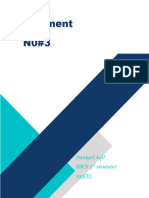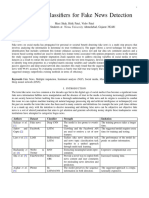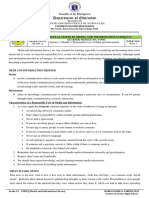Assignment: 2
Abdullah Siddiqi
01-154212-088
7A
Submitted to: Sir Waheed
Prevention of Electronic Crimes (Amendment) Act 2025
The Prevention of Electronic Crimes (Amendment) Act 2025 is an updated version of the original
Prevention of Electronic Crimes Act (PECA) passed in 2016 by the Government of Pakistan. The original
law was designed to handle crimes committed through electronic systems, especially the internet, such as
hacking, identity theft, cyberbullying, and online harassment. The 2025 amendment was introduced to
update, expand, and, according to the government, “strengthen” the legal framework regarding online
activities, especially on social media platforms. However, it has been widely criticized by journalists,
digital rights activists, and legal experts for limiting freedom of speech and controlling media expression.
Main Purpose of the Act
The stated aim of the amendment is to control the spread of false information, cyberbullying, hate speech,
and the misuse of online platforms, especially those that target individuals or public institutions such as
the military, judiciary, and government officials. The government argues that the digital world is
expanding rapidly and, without proper laws, it becomes difficult to control harmful content and
cybercrimes that affect both individuals and national security.
Key Provisions of the Amendment
The Prevention of Electronic Crimes (Amendment) Act 2025 includes several new or modified
provisions:
1. Stricter Punishments: The punishment for offenses such as online defamation, fake news, and
spreading “anti-state narratives” has been increased. Jail time and heavy fines are introduced for
those found guilty.
2. Criminal Defamation: Under this law, any person who spreads false information or content on
social media that harms the reputation of another person or institution can be arrested without a
warrant. This includes individuals, journalists, or media outlets.
3. Removal of Content: The law gives more power to the Pakistan Telecommunication Authority
(PTA) to remove or block online content without court permission. The PTA can ask any
platform, including Facebook, YouTube, or Twitter, to take down content that is considered
offensive or harmful.
4. Extension of Scope: Previously, the law mostly covered individuals. The amendment expands its
scope to include legal entities, such as media houses and digital news platforms, meaning that
entire organizations can be charged or fined.
5. No Bail for Certain Offenses: Some offenses under this amendment are declared non-bailable,
meaning the accused cannot easily get released until proven innocent or granted bail by a higher
court.
6. Increased Surveillance: The government and law enforcement agencies are allowed more power
to monitor digital activity, collect data, and access private communications if they suspect any
unlawful content.
�Types of Crimes Covered
The law covers a wide range of electronic crimes, including:
Online harassment or blackmailing
Cyberstalking or misuse of images and videos
Hacking into someone’s account or stealing personal data
Spreading fake news or misinformation
Defaming any individual, institution, or public figure
Promoting hate speech or religious intolerance
Attacking the judiciary, army, or state institutions through social media
While it is important to regulate harmful online behavior, the vague and broad language of the law has
raised concerns. One of the biggest criticisms of the 2025 amendment is that it can be easily misused by
the government to silence critics, journalists, and activists. The Constitution of Pakistan guarantees
freedom of expression, but this law gives unchecked power to authorities to interpret what is “offensive”
or “anti-state.” Here’s why it is being considered a restriction:
Vague Language: Words like “fake news” or “anti-state narrative” are not clearly defined. This
means anyone sharing a different opinion, criticizing the government, or highlighting corruption
can be labeled a criminal.
Media Control: Independent journalists and media platforms often use social media to report
stories. If these stories go against the government’s narrative, they can be blocked or punished
under this law.
Fear of Arrest: The fear of being jailed or harassed discourages people from speaking freely on
public issues, even if they are raising valid concerns.
Lack of Judicial Oversight: The PTA can block content without a court order. This reduces
transparency and allows censorship without legal checks.
Targeting Dissent: Political opponents, civil society members, and online activists who criticize
the government or expose injustices can be arrested or silenced using the law.
Impact on Democracy: In a democratic society, freedom of speech is essential. This law can be
used to reduce open debate, control information, and hide the truth from the public.
The Prevention of Electronic Crimes (Amendment) Act 2025 has introduced important updates to
Pakistan’s cyber laws, especially in response to the growing use of social media. While it aims to stop
cyberbullying, misinformation, and digital defamation, its implementation raises serious concerns about
freedom of expression and media independence. Laws that restrict speech must be carefully worded and
monitored to avoid misuse. In a democratic country, it is important to protect both national security and
the people’s right to speak freely, criticize, and hold power accountable.
Reactions and Protests
There has been strong opposition to the amendment from journalists’ unions, human rights organizations,
and opposition parties. The Pakistan Federal Union of Journalists (PFUJ), Human Rights Commission of
Pakistan (HRCP), and other digital rights groups like Digital Rights Foundation (DRF) have called the
law a violation of human rights. Some have even taken the matter to court, demanding that the
amendment be reviewed or struck down for being unconstitutional.
�Many experts believe that while laws are necessary to deal with cybercrimes, they must be fair,
transparent, and protective of citizens’ rights, not tools of control. There should be a balance between
regulating harmful content and allowing free, honest discussion in society.
The real solution lies in making balanced laws that punish real cybercriminals without silencing the
voices of ordinary citizens, journalists, and human rights defenders.






















































































